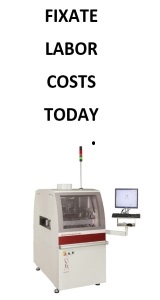Printed Circuit Board Assembly & PCB Design Forum
SMT electronics assembly manufacturing forum.
- SMTnet
- »
- Electronics Forum
- »
- Oop's Pb BGA's in a RoHS process?
Oop's Pb BGA's in a RoHS process?
Views: 7713
![]() Hi,
We ran some boards and the girl on the line put in so...
- Jun 16, 2006
by
Grant
Hi,
We ran some boards and the girl on the line put in so...
- Jun 16, 2006
by
Grant
![]()
![]()
![]() Hi Grant,
I can't speak for reliability, I don't know how y...
- Jun 16, 2006
by
jbrower
Hi Grant,
I can't speak for reliability, I don't know how y...
- Jun 16, 2006
by
jbrower
![]()
![]()
![]() Hi Grant,
just my opinion, I think the concern could be r...
- Jun 16, 2006
by
Hi Grant,
just my opinion, I think the concern could be r...
- Jun 16, 2006
by
![]()
![]()
![]() Hi,
Reliability was what I was worried about.
We have ...
- Jun 16, 2006
by
Grant
Hi,
Reliability was what I was worried about.
We have ...
- Jun 16, 2006
by
Grant
![]()
![]()
![]() Hi Grant,
I understand your concerns about the reliability....
- Jun 16, 2006
by
Mika
Hi Grant,
I understand your concerns about the reliability....
- Jun 16, 2006
by
Mika
![]()
![]()
![]() There are plenty of studies on this subject. If the BGA can...
- Jun 19, 2006
by
There are plenty of studies on this subject. If the BGA can...
- Jun 19, 2006
by
![]()
![]() Hi,
In our setup what we usually avoid is to use RoHS BGA o...
- Jun 19, 2006
by
Hi,
In our setup what we usually avoid is to use RoHS BGA o...
- Jun 19, 2006
by
![]()
![]() whats an x-rated tool??
sounds like something you can buy i...
- Jun 19, 2006
by
Slaine
whats an x-rated tool??
sounds like something you can buy i...
- Jun 19, 2006
by
Slaine
![]()
![]()
![]() Loco, I will look for that Motorola study. Personally, we h...
- Jun 19, 2006
by
suboc
Loco, I will look for that Motorola study. Personally, we h...
- Jun 19, 2006
by
suboc
![]()
![]()
![]() Again, the verdict is mixed here as well, but from the semin...
- Jun 20, 2006
by
Samir Nagheenanajar
Again, the verdict is mixed here as well, but from the semin...
- Jun 20, 2006
by
Samir Nagheenanajar
![]()
![]()
![]() Under fill them.
...
- Jun 20, 2006
by
Under fill them.
...
- Jun 20, 2006
by
![]()
![]() This has been debated several times on this forum, but I hav...
- Jun 20, 2006
by
muse
This has been debated several times on this forum, but I hav...
- Jun 20, 2006
by
muse
![]()
![]()
![]() Hi,
That's a really interesting article, however one thin...
- Jun 20, 2006
by
Grant
Hi,
That's a really interesting article, however one thin...
- Jun 20, 2006
by
Grant
![]()
![]()
![]() Hi,
What are your thoughts about the article saying that ...
- Jun 20, 2006
by
Grant
Hi,
What are your thoughts about the article saying that ...
- Jun 20, 2006
by
Grant
![]()
![]()
![]() We all know those academic 'reliability studies' are very fo...
- Jun 20, 2006
by
davef
We all know those academic 'reliability studies' are very fo...
- Jun 20, 2006
by
davef
![]()
![]()
![]() Finally found a link to the NPL report, good reading.
...
- Jun 21, 2006
by
Finally found a link to the NPL report, good reading.
...
- Jun 21, 2006
by
![]()
![]() Hi Muse,
what do you mean by "with a SAC Ball and SnPb Past...
- Jun 21, 2006
by
Amol Kane
Hi Muse,
what do you mean by "with a SAC Ball and SnPb Past...
- Jun 21, 2006
by
Amol Kane
![]()
![]()
![]() Burn from dave on again Chunks!
I agree with dave - get...
- Jun 21, 2006
by
Dr Shocker
Burn from dave on again Chunks!
I agree with dave - get...
- Jun 21, 2006
by
Dr Shocker
![]()
![]()
![]() Hi,
That was another very interesting article posted.
...
- Jun 21, 2006
by
Grant
Hi,
That was another very interesting article posted.
...
- Jun 21, 2006
by
Grant
![]()
![]()
![]() That is about what I gathered as well grant, if the pb part ...
- Jun 21, 2006
by
RDR
That is about what I gathered as well grant, if the pb part ...
- Jun 21, 2006
by
RDR
![]()
![]()
![]() I see what you're saying - I'm not a process guru by any mea...
- Jun 21, 2006
by
muse
I see what you're saying - I'm not a process guru by any mea...
- Jun 21, 2006
by
muse
![]()
![]()
![]() Unless it was an x-rated tool built by a woman.
...
- Jun 21, 2006
by
Unless it was an x-rated tool built by a woman.
...
- Jun 21, 2006
by
![]()
![]() Grant,
The best rule is- "If it works don't touch it".
W...
- Jun 22, 2006
by
Evtimov
Grant,
The best rule is- "If it works don't touch it".
W...
- Jun 22, 2006
by
Evtimov
![]()
![]()
![]() Ha ha, very funny. Not as funny as our burn on YOU!
...
- Jun 22, 2006
by
Dr Shocker
Ha ha, very funny. Not as funny as our burn on YOU!
...
- Jun 22, 2006
by
Dr Shocker
![]()
![]()
![]() Yesa yes Samir - you are stupid to form any other opinion bu...
- Jun 22, 2006
by
Dr Shocker
Yesa yes Samir - you are stupid to form any other opinion bu...
- Jun 22, 2006
by
Dr Shocker
![]()
![]()
![]() Oh yeah, I forgot about the great big burn of 2006 you and d...
- Jun 22, 2006
by
Oh yeah, I forgot about the great big burn of 2006 you and d...
- Jun 22, 2006
by
![]()
![]() Hi,
Yes, I agree, and it seems like these studies were de...
- Jun 22, 2006
by
Grant
Hi,
Yes, I agree, and it seems like these studies were de...
- Jun 22, 2006
by
Grant
![]()
![]()
![]() "We certainly live in a better world now."
Regarding lead...
- Jun 22, 2006
by
Paul M.
"We certainly live in a better world now."
Regarding lead...
- Jun 22, 2006
by
Paul M.
![]()
- SMTnet
- »
- Electronics Forum
- »
- Oop's Pb BGA's in a RoHS process?








